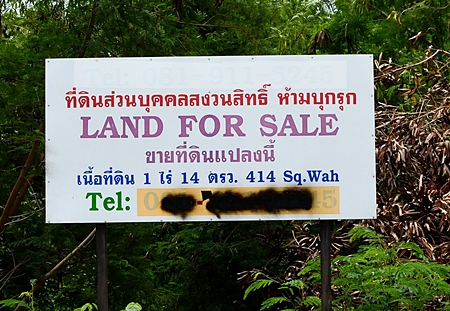It is well known that ownership of land by foreigners in Thailand is restricted. Thus, a long-term leasehold is often the best option for a foreigner to invest in real estate.
However, the duration of leasehold in Thailand is limited to thirty years by Section 540 of the Civil and Commercial Code (the “CCC”). It is generally agreed that thirty years is rather short when one is making an investment of any significance and in order to “overcome” this limitation a typical long-term lease agreement in Thailand will provide for two additional successive periods of 30 years each; this despite the fact that current Thai law provides for only one such renewal. However, we will not discuss the issue of a second renewal here.

Due to such restrictions, for many years now, developers and consumers have been calling for an extension of the maximum lease term. However, extending the current maximum lease term and/or renewal periods under Section 540 of the CCC would require a change of law and, therefore, parliamentary approval. However, for various reasons, achieving more favourable long-term lease conditions at this level of the legislative process has been infeasible.
Thus, quite understandably and admirably, the Joint Foreign Chambers of Commerce (the “JFCC”) has been working on a proposal to extend the maximum lease term. In March 2010 the JFCC’s Property Committee finalized and submitted a white paper to the Thai government entitled “Proposal for Leasehold Extension” (the “JFCC Proposal”). The JFCC Proposal articulates many well founded reasons why the legally enforceable lease-term in Thailand should be longer than it currently is.
The authors of this article agree with the JFCC’s position and reasoning in such regard. The JFCC Proposal then states that its objective is to “identify an appropriate and feasible solution to the legal disadvantages that are hindering the growth and development of Thailand’s property market … the key solution would be the increase of the legal leasehold term,” (JFCC Proposal, page 5). We agree.
The whitepaper’s introduction then recognizes that changing the law itself would be difficult and so it is asserted that the JFCC’s Proposal will “focus instead on a fast-track solution that is available under existing law.” (JFCC Proposal, page 5). We also agree that such an easy “solution” would be preferable if it existed, but unfortunately it does not.
It is our position here that, however well intended, the JFCC Proposal fails to understand the relevant law and that its core proposals are not workable under existing law. The JFCC should withdraw the JFCC Proposal and focus its efforts in this regard instead on advocating for a change to Section 540 of the CCC such that it would allow for a longer maximum lease term.
The first “more achievable and sensible solution” according to the JFCC’s Proposal would be “the revision of the Land Department regulations to ensure that two lease agreements can be registered and enforced in accordance with the CCC, on a back-to-back basis, allowing for a clear, definite 60-year term.” (JFCC Proposal, page 5).
Clearly the JFCC recognizes that the CCC currently limits the maximum lease term to thirty years. However, the JFCC also appears to believe that a lease is enforceable merely through registration. In fact, the JFCC bemoans: “with the current practice of Land Officers, in most cases, [a] second lease agreement can only be registered [and therefore] binding only after the first lease term has ended . . . [however] the second lease term is not binding until it is registered …” (JFCC Proposal, page 8). “The regulation should state clearly that the Land Department will register and enforce back-to-back leases of 30 years each, in accordance with the CCC, allowing the 60-year consecutive lease term.” (JFCC Proposal, page 13).
To the unfortunate detriment of all of those who would like to see a reliable longer lease term here in Thailand, the JFCC’s efforts are based on fundamental misunderstandings of the relevant law, and therefore are misguided. Obviously the Land Department does not “enforce” land leases. The Land Department is charged with the duty, among others, to register land leases. However, since it bears directly on their white paper’s core recommendation to the Thai government, the more profound of the JFCC’s misunderstandings has to do with the legal effect of a lease registration.
The registration of a land lease and its legal effect seems to be one of the common mysteries in Thai real estate law. The common misunderstanding is that the “registration” somehow makes all elements of a lease contract enforceable and unassailable. The registration of the lease is, however, merely an administrative act.
To the extent that the registration does trigger any legal rights between contract parties, e.g. a lessor and lessee, such rights come from the law itself and not from the administrative act of registration. For example, it is true that under Section 538 of the CCC any lease over three years must be registered or it will not be enforceable beyond three years. Obviously, this is why parties register long-term leases. Nonetheless, registration itself triggers no further legal relations or obligations between the lessor and lessee than those outlined in such Section 538 of the CCC.
The only legal effect of lease registration beyond Section 538 is that it makes the lease agreement a matter of public record but it does not make an otherwise unenforceable lease, enforceable. In other words, simultaneous registration of a second 30 year lease term does not make that second term automatically enforceable; thinking it would, is a fundamental misconception of the current law.
Current Thai law does not provide for an “extension” of a lease term; rather and only it provides for a “renewal”. For example, if during the first 30 year land lease term, the lessor changes (i.e. the land ownership transfers to a new owner for whatever reason) and such initial term ends, the new lessor would be under no obligation to enter into a new lease with the lessee. Such would be the case even if the original lessor had already “registered” a renewal term.
Thus, the relevant legal question is: “who is the owner of the land at the beginning of the new lease term?” Only the owner at the time of renewal, at the beginning of the new term, can act as the lessor and at that time enter into a lease agreement with the lessee. Therefore, merely registering the second 30 year renewal term would not itself make that renewal term enforceable.
Apparently the source of the JFCC’s confusion is also as a result of its misunderstanding of Section 569 of the CCC. “Based on Section 569 of the CCC, only the contractual rights and obligations under an immovable property lease agreement are transferred and binding on the transferee to the land title. Meanwhile, the ‘renewal option’ in the agreement is only considered as a ‘promise’ made by and between the lessor to the lessee, and will not be transferred to the successor/transferee, unless such transferee has accepted to be bound by such promise … regardless as to whether the lease agreement has specifically stipulated for the renewal option to also be binding on the successor of the lessor.” (JFCC Proposal, page 8).
It is true under Section 569 of the CCC if land is leased for e.g. thirty years and the ownership changes during that thirty years, the new lessor is bound by that lease. It is however also true that the same said new land owner would not be bound by an option/promise to renew the said lease made by the prior land owner. The reason is that the option/promise is not a part of the first thirty year lease by which the new land owner is bound under Section 569. Therefore, if the promise to renew is not a part of the first lease and not binding on the new land owner then most certainly neither is a second “new” lease made by the first land owner. Any such second lease is definitely no more a part of the first lease than is an option to renew the first lease.
It can be concluded that: (i) Section 569 of the CCC only binds a new land owner to a lease that currently exists; and (ii) a second lease to be renewed does not at that point legally exist and the mere act of registration does not make it a currently existing lease.
The second core idea of the JFCC Proposal is to extend the applicability of the Lease of Immovable Property for Commercial and Industrial Purposes Act (1999) (the “Act”). “The scope of this Act is limited. Our recommendation is that it should extend to ‘residential purposes’.” (JFCC Proposal, page 13).
Apparently the JFCC focuses on the Act because it does provide for a maximum lease term of fifty years. However, Section 3 of the Act and the legislative comments to the Act make it very clear that the only permissible purposes of any lease under the Act are commercial or industrial. It is, therefore, not permissible for someone to use the Act for a fifty year lease for residential or recreational purposes.
Thus, “extending” the application of the Act to residential activities would require amending a law, i.e. the Act, itself. Of course that means that this proposal is no more attractive than amending the CCC itself. And in fact, considering that the Act is the “Lease of Immovable Property for Commercial and Industrial Purposes Act”, amending the CCC instead must certainly be more reasonable and likely.
Thus, what is needed are not legally ineffective administrative acts or a change to a law intended for commercial and industrial purposes as currently proposed by the JFCC. The only way forward is an amendment to the relevant law i.e. to Section 540 of the CCC itself, to provide for a lease term of more than 30 years. Pushing for such a measure would undoubtedly make JFCC’s efforts more efficient and would perhaps provide a real opportunity to hope for all the benefits that would accrue to Thailand and those investing here by way of a longer maximum lease term.
Note: Article written by Duensing Kippen Tax & Law, a multi-service boutique law firm specializing in property and corporate/commercial matters, as well as arbitration proceedings. For more information please visit them at: www.duensingkippen.com.




